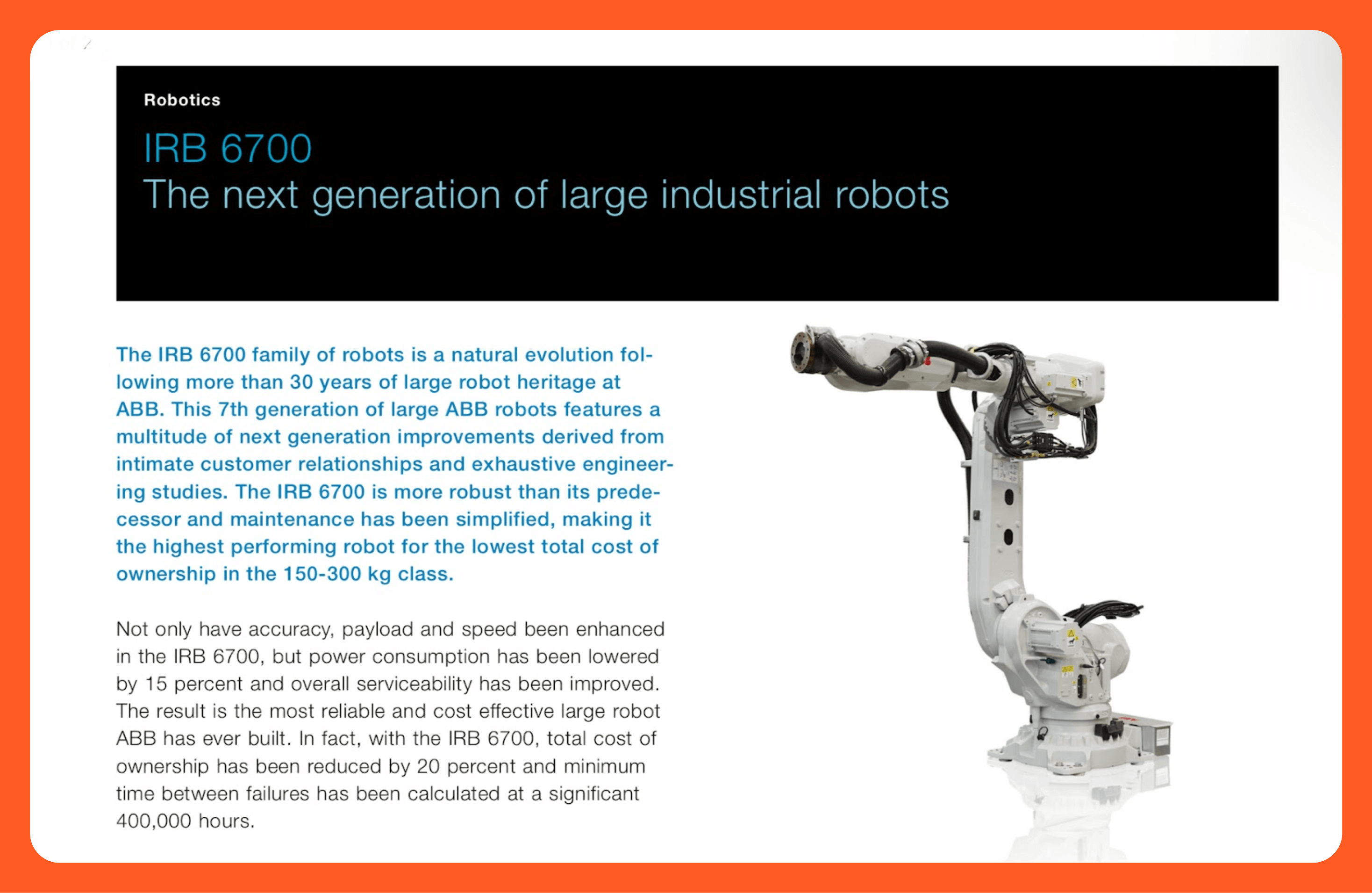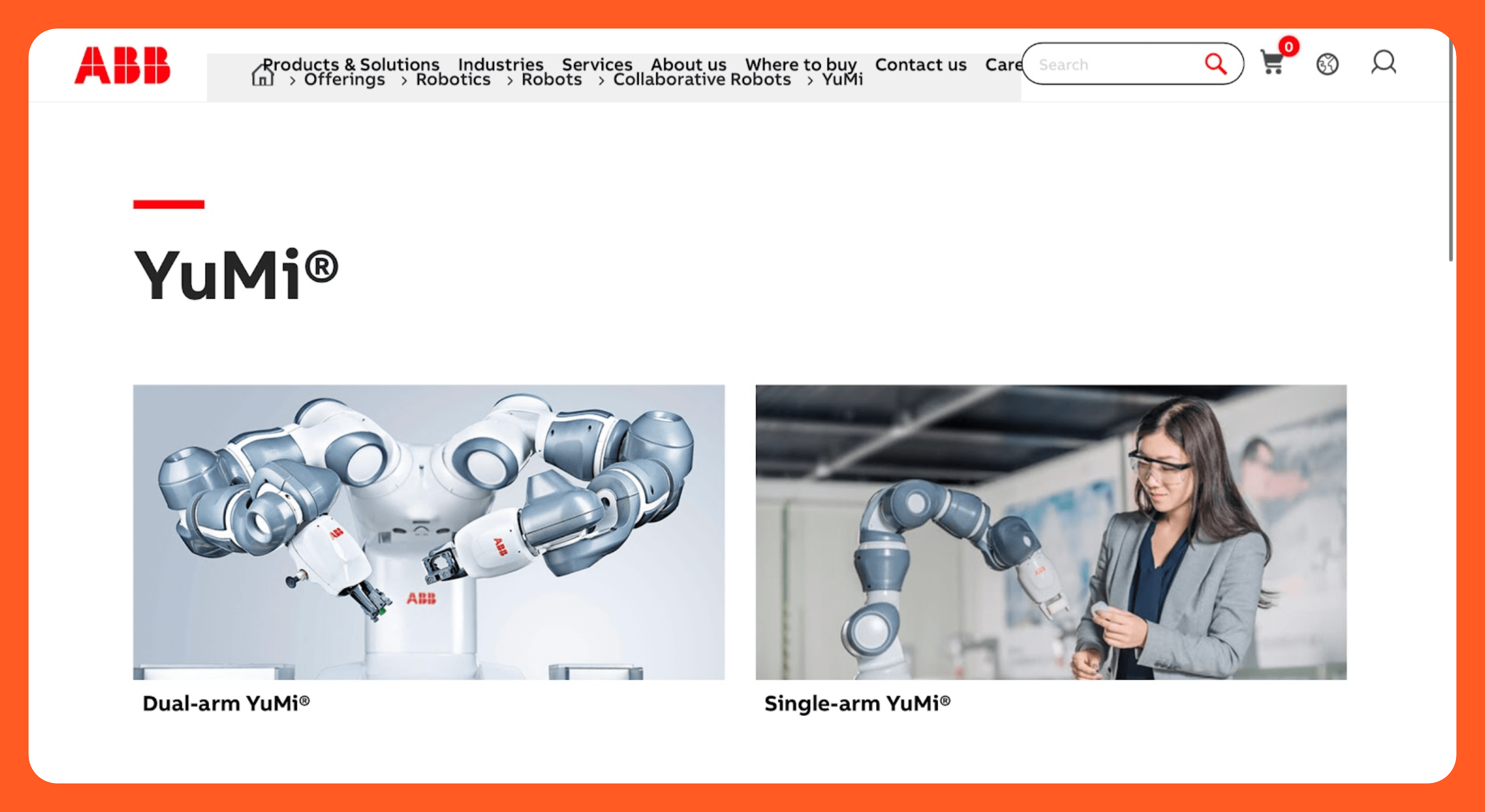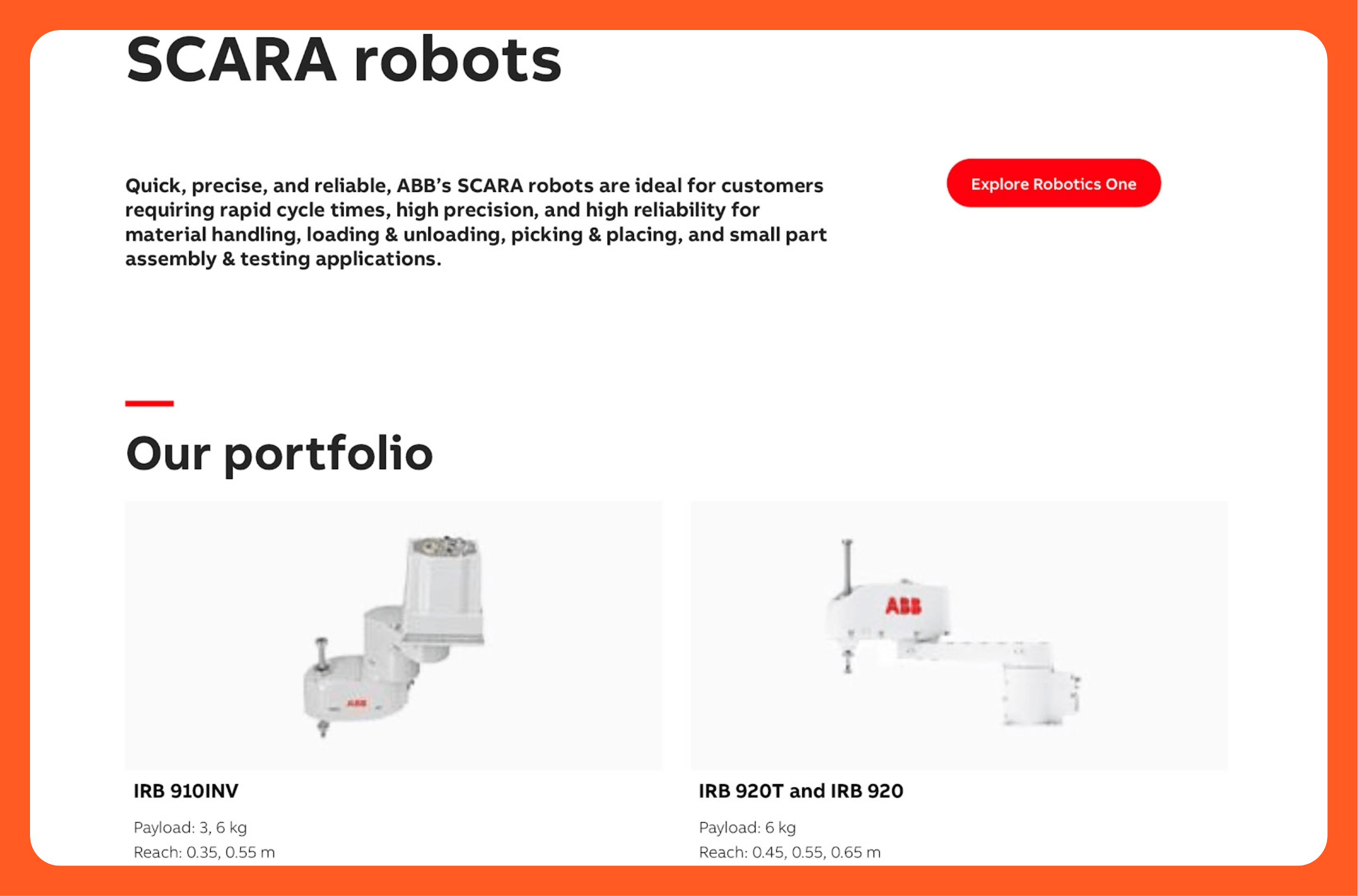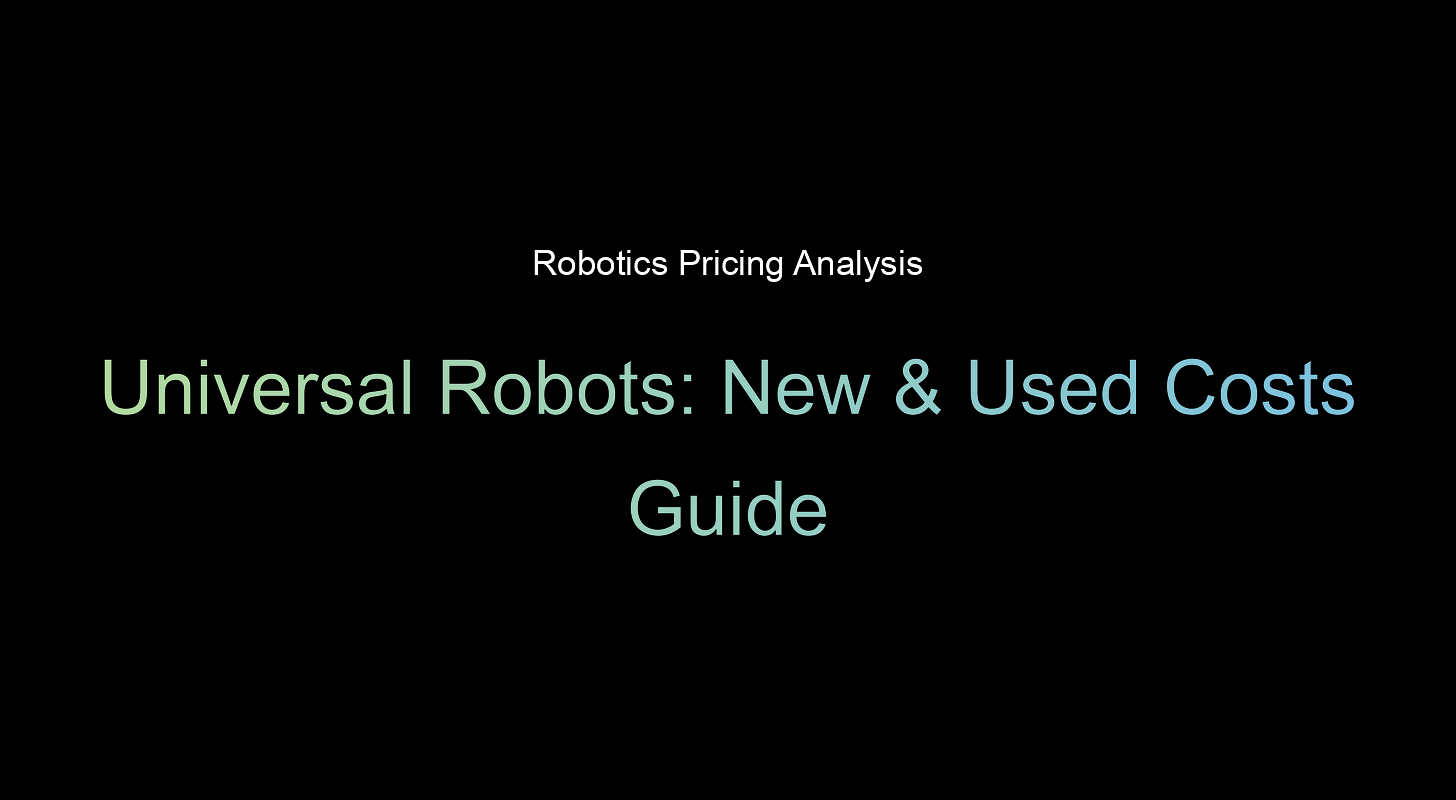ABB’s robots are a mainstay in factories worldwide, used for welding, assembly, and precision handling. But how much does one cost in 2025? Prices range from about $15,000 for compact SCARA models to over $200,000 for advanced dual-arm and heavy-duty systems.
This guide breaks down real-world ABB pricing so you know exactly what you’re paying for and why.
What are ABB robots?
ABB robots are industrial robots manufactured by ABB, a company specializing in robotics, power, automation, and electrification products. They are known for their versatility and are used in various industries for tasks like material handling, welding, machine tending, and assembly.
ABB offers a wide range of robots, including articulated robots, collaborative robots (cobots), and autonomous mobile robots (AMRs).
With over 500,000 robots installed globally, ABB is one of the largest players in industrial automation. Their robots are known for reliability, advanced motion control, and integration with ABB’s simulation software, RobotStudio.
The company’s portfolio includes a wide range of robots from compact 4-axis SCARAs for electronics to heavy-duty 6-axis arms for foundry environments. ABB also makes collaborative robots (cobots) under the YuMi brand, designed to work safely alongside human operators.
How much do ABB robots cost in 2025?
ABB robot pricing in 2025 varies significantly based on model, payload, and application requirements. Based on industry analysis and distributor estimates:
- Entry-level systems: Compact models like the IRB 120 series compete with mid-range competitors
- Collaborative robots: YuMi models are priced at a premium compared to universal cobot alternatives
- Heavy-duty arms: Large payload systems command industrial-grade pricing
Note: ABB uses distributor-based pricing that varies by region and configuration. Contact authorized ABB distributors for current quotes.
ABB robot model price list
IRB series overview

IRB 120 positioning: The entry-level ABB IRB 120 is ABB's most accessible industrial robot, popular for light material handling, assembly, and education. It's a compact 6-axis arm with a 3 kg payload and 580 mm reach, making it ideal for small automation cells.
IRB 1010 and 1090 specialization: The IRB 1010 is designed for compact electronics handling, while the IRB 1090 targets education and lightweight assembly applications. Both models excel in tight workspaces and fast cycle applications where space efficiency is critical.
IRB 2600 versatility: A mid-tier performer, the IRB 2600 balances speed, payload, and reach for general-purpose factory automation, making it suitable for diverse manufacturing environments.
ABB YuMi cobots

YuMi is ABB’s collaborative robot line, designed for safe, flexible use alongside humans. There are two models: the single-arm YuMi and the original dual-arm YuMi. Both are ideal for small parts assembly, lab automation, and consumer electronics industries where safety, precision, and space-saving designs matter.
Single-arm YuMi pricing starts around $30,000 to $40,000. This version has a 0.5 kg payload and 559 mm reach, and is often chosen for compact cells or desktop workstations. It’s also lightweight and easily redeployable.
Dual-arm YuMi robots typically cost between $45,000 and $60,000, depending on configuration and accessories. This model features two 7-axis arms with force sensing and integrated vision, allowing it to perform tasks that require fine coordination such as screwdriving or part insertion with high repeatability.
While ABB cobot prices are generally higher upfront, they include tight integration with RobotStudio and better support for large-scale deployments.
SCARA and Foundry Plus 2 models

ABB’s SCARA robots are designed for high-speed, high-precision tasks like electronics inspection, small part assembly, and pick-and-place in tight spaces. Models like the IRB 910INV and IRB 920 offer compact footprints, vertical mounting options, and sub-millimeter accuracy.
The ABB SCARA robot price in 2025 typically falls between $15,000 and $25,000, depending on the model and reach. These robots are a cost-effective option for industries requiring fast cycle times and minimal floor space.
Foundry Plus 2 variants available across many IRB models are built for extreme environments like die casting, forging, and high-heat applications. They come with sealed joints, specialized coatings, and IP67-level protection.
The ABB Foundry Plus 2 price varies widely based on the base robot model, but you can expect to pay an additional $10,000 to $20,000 over standard versions.
For instance, an IRB 6700 Foundry Plus 2 setup could cost $130,000 to $150,000 once fully equipped with safety-rated peripherals and enclosures.
What affects ABB robot pricing?
The cost of an ABB robot isn’t just about the hardware. A wide range of factors, from payload and axis count to industry-specific tooling and software integrations, can shift the price significantly.
Here’s a breakdown of the key variables that determine the final cost in 2025.
1. Payload capacity, reach, and repeatability
These three core specs heavily influence base pricing:
- Lightweight arms like the IRB 120 or IRB 1010, with payloads under 5 kg and short reaches (400 to 600 mm), represent the entry-level pricing tier for industrial robots.
- Mid-range robots such as the IRB 2600 or IRB 4600, with 20 to 60 kg payloads and 1.5 m reach.
- Heavy-duty arms like the IRB 6700, which support payloads over 150 kg.
Repeatability also matters. Arms with sub-0.02 mm accuracy will cost more than those built for general pick-and-place.
2. Axis count and configuration
More axes mean greater flexibility and a higher price tag. A basic SCARA with 4 axes may cost $15,000 to $25,000, while a standard 6-axis industrial arm lands closer to $30,000 to $80,000, depending on other specs.
Custom configurations like 7-axis dual-arm setups (e.g., ABB YuMi) or rotary base options increase both complexity and cost. Expect to pay a premium for setups that need more than 6 degrees of freedom or adaptive part access.
3. Application-specific tooling and integration
An ABB robot alone doesn’t make a complete system. Depending on your use case, you may also need:
- End-of-arm tooling (EOAT): Grippers, welding torches, screwdrivers, or vacuum tools. These can cost $3,000 to $25,000, depending on complexity.
- Conveyor or machine I/O: Integration kits and programmable logic controllers (PLCs) add $2,000 to $8,000.
- Safety infrastructure: Fencing, laser scanners, or safety PLCs are often required for non-cobot setups, costing another $5,000 to $15,000.
For example, a basic ABB IRB 6700 welding setup can easily top $120,000 once you factor in the robot, torch system, controller, EOAT, and safety add-ons. Learn more about cost layers in our guide to buying an automatic painting robot, where similar considerations apply.
4. Smart features and AI integrations
Advanced users often add:
- Vision systems (e.g., Cognex or ABB integrated cameras)
- AI-guided bin picking
- Force-torque sensors
- Path optimization software
Each of these can raise the system cost by $5,000 to $20,000, depending on whether it’s factory-installed or retrofitted later.
These features are particularly common in high-variance applications like picking irregularly shaped parts or conducting inline inspections.
5. Refurbished vs. new models
Going refurbished can save 30–50% on upfront costs. A used IRB 4600 might cost $25,000 instead of $45,000, depending on hours used and warranty status.
However, it’s important to factor in
- Shorter warranties
- Limited software support
- Potential retrofit needs for safety compliance
For low-volume or non-critical environments (like training or light assembly), refurbished robots can be a smart move. But if you’re running a 24/7 production or welding, newer models are typically worth the higher price tag.
ABB RobotStudio pricing explained
RobotStudio is ABB’s official offline programming and simulation software. It lets engineers build, test, and optimize robot cells virtually before deploying them on the factory floor. This cuts integration time, reduces errors, and improves safety.
RobotStudio comes in two tiers:
- Basic: Free to use. Includes essential tools like simulation, jogging, and editing for both virtual and real robots.
- Premium subscription: Unlocks offline programming, advanced debugging, simulation tools, PowerPacs (e.g., Welding, Picking), and collaboration capabilities via RobotStudio Cloud
Exact pricing is not published publicly. ABB describes Premium as available at a “low annual fee,” but users must request quotes via local sales channels. Network licensing options are similarly available but priced on a case-by-case basis.
Add-on modules and simulation packages
For more advanced tasks like path optimization, multi‑robot coordination, or external axis programming, you’ll need additional simulation packages like:
- Welding PowerPac
- RobotStudio Cutting PowerPac
- RobotWare Add‑Ins (for force control, palletizing, etc.)
Industry sources suggest these add‑ons can cost $500 to $3,000 each, depending on functionality.
But like the Premium license, ABB does not publish official add‑on pricing publicly, and costs vary by distributor, region, and negotiated terms. These are one‑time charges unless bundled into a subscription plan.
ABB robot pricing and global variation
ABB is a global company, and its robot pricing varies by region due to taxes, import duties, freight, and local support costs. Whether you’re buying in the U.S., India, or the EU, understanding these differences can help avoid surprise costs and plan your automation budget more accurately.
U.S. pricing vs. global
In the United States, ABB robots are often priced at the lower end of their global range due to:
- Shorter delivery times
- Local manufacturing and assembly
- In-country support and warranty services
For instance, a base IRB 6700 may start around $90,000 in the U.S., but cost closer to $105,000 to $120,000 after import duties and logistics in Southeast Asia or Eastern Europe.
In India, ABB robot costs include additional factors beyond base pricing:
- Freight, insurance, and local service costs
- Currency fluctuations are affecting international pricing
- Import duties and GST totaling up to 28% for industrial robots
These factors typically result in 20–30% higher total costs compared to domestic U.S. markets.
Localization and compliance costs
Some industries also require localized certifications or safety upgrades, which add to the total cost:
- Language-specific software interfaces or manuals
- IP-rated enclosures for humid or dusty environments
- Electrical compliance for specific countries (e.g., CE vs UL)
Pricing is further impacted if you’re working in niche sectors like pharmaceutical cleanrooms or foundries.
For compact automation projects or light-duty assembly, ABB’s SCARA line can offer cost advantages in regions with high import fees.
How does ABB pricing compare with other brands?
Final thoughts: Is an ABB robot worth it in 2025?
ABB robots in 2025 range from $15,000 SCARA models to heavy-duty IRB systems exceeding $200,000. Pricing depends on payload, reach, application-specific tooling, and integration needs. Their IRB lineup and RobotStudio software deliver high uptime, precision, and advanced simulation for complex, multi-robot production.
Though the upfront investment is higher than some competitors', the ROI often comes in 14 to 24 months for high-volume, continuous operations. For lighter tasks like pick-and-place or inspection, a smaller cobot like RO1 or a YuMi can achieve faster payback at a lower total cost.
Next steps with Standard Bots
Looking to upgrade your automation game? Standard Bots’ RO1 is the perfect six-axis cobot addition to any robotic setup, delivering unbeatable precision and flexibility.
- Affordable and adaptable: RO1 costs $37K. Get high-precision automation at half the cost of traditional robots.
- Precision and power: With a repeatability of ±0.025 mm and an 18 kg payload, RO1 handles even the most demanding CNC jobs.
- AI-driven simplicity: Equipped with AI capabilities on par with GPT-4, RO1 integrates seamlessly with CNC systems for advanced automation.
- Safety-first design: Machine vision and collision detection mean RO1 works safely alongside human operators.
Schedule your on-site demo with our engineers today and see how RO1 can bring AI-powered greatness to your shop floor.
FAQs
1. How does ABB RobotStudio licensing work, and what does it cost annually?
RobotStudio licensing includes a free Basic version and a paid Premium subscription. The Basic version covers essential tools like simulation and editing, while Premium adds offline programming, advanced simulation, and PowerPac add-ons. ABB does not publish Premium pricing, so you’ll need to request a quote from your local ABB sales office.
2. What financing or leasing options are available for ABB industrial robots?
Financing or leasing options available for ABB industrial robots include programs in several countries through approved integrators and equipment financing partners. Leasing can range from 36 to 60 months and often includes maintenance, software licenses, and installation.
This option helps lower upfront capital costs while still providing access to premium robots like the IRB 4600 or IRB 6700. In the U.S., tax incentives like Section 179 may also apply when leasing industrial robots.
3. What import duties impact ABB robot prices in India?
In India, import duties can collectively add up to 20–30% to the base robot price. Additional costs include freight, insurance, and local service fees.
For a mid-sized system like the IRB 2600, that could translate to an extra ₹6 to 10 lakhs depending on configuration. Some integrators offer bundled packages with local warranty and installation to streamline procurement.
4. How do warranties differ between new and refurbished ABB robots?
New ABB robots typically come with a 1- to 2-year factory warranty, including controller, motor, and part replacements, plus access to ABB’s global service network. Refurbished models, on the other hand, usually offer a 6- to 12-month limited warranty, depending on the reseller.
Whereas refurbished units cost 30–50% less, they may lack the latest software versions or require compatibility adjustments when integrating with modern peripherals.
5. Can ABB robots be upgraded with AI vision systems after purchase?
Yes. ABB robots can be upgraded with post-purchase integration of AI vision, 3D cameras, and force sensors via RobotStudio and RobotWare add-ons. These upgrades often require new licenses or external software packages and may involve I/O reconfiguration or safety reassessment.
Common use cases include bin picking, defect detection, and dynamic path correction in packaging and machining environments.
6. What is the typical ROI period for an ABB IRB 6700 in a welding application?
The typical ROI period for an IRB 6700 welding setup can be 14 to 24 months. ROI depends on factors like throughput improvement, labor offset, rework reduction, and operational uptime.
Integration with ABB’s Welding PowerPac and optimized torch paths via RobotStudio can further accelerate return by reducing setup time and cycle errors.
7. Are ABB robots compatible with third-party safety scanners and sensors out of the box?
Yes. ABB robots are highly compatible with industry-standard safety scanners, light curtains, and emergency stop systems, including brands like Sick, Omron, and Keyence. Most models include safety-rated I/O ports and integrated SafeMove options for zone control and reduced-speed collaboration.
However, some features may require activation through ABB’s RobotWare licensing system or additional hardware configuration during setup.
Join thousands of creators
receiving our weekly articles.









.png)

